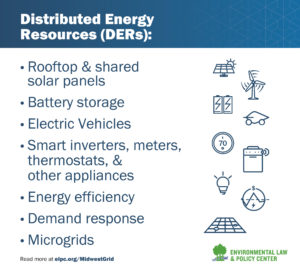Rooftop Solar in Illinois
February 04, 2021
Compensation for Distributed Energy Resources: Looking Toward the FUTURE
ELPC is engaged with colleagues and allies in several Midwest proceedings that will help shape the future direction of DER compensation.
Five years ago the so-called utility “death spiral” was the hot topic in utility regulatory circles. Utilities proposed increased fixed charges and monthly solar fees to slow down distributed solar deployment while solar advocates dug in their heels to defend retail net metering. States like Wisconsin and Arizona became ground zero for bare-knuckled regulatory fights that led largely to a stalemate on net metering, rate design, and solar compensation.
 Today, thankfully, there is growing recognition on all sides that distributed energy resources (DERs) – including rooftop solar, battery storage, energy efficiency, demand response, and electric vehicles – can provide great value to the distribution grid and society, especially when strategically deployed and used in combination.
Today, thankfully, there is growing recognition on all sides that distributed energy resources (DERs) – including rooftop solar, battery storage, energy efficiency, demand response, and electric vehicles – can provide great value to the distribution grid and society, especially when strategically deployed and used in combination.
What does this mean for net metering and other proven retail solar compensation programs? It might suggest opportunities for evolution towards more sophisticated programs that capture DER value. But designing new policies for DER compensation will require states to carefully balance the need to (1) encourage deployment in ways that leverage the range of benefits that DERs can provide to the gird and society, while (2) preserving a stable and financeable policy environment to support rapid market growth.
The Environmental Law & Policy Center is engaged with colleagues and allies in several Midwest proceedings that will help shape the future direction of DER compensation:
In Illinois, the ICC is investigating proposals to transition from retail net metering to successor “value-based” tariffs for DERs that recognize the distinct locational and temporal values of DERs on the utility distribution grid. (ICC Docket 20-0389)
In Indiana, advocates are pushing back against a southern Indiana utility’s proposal to replace retail net metering with an “inflow-outflow” tariff that undervalues customer generaton. (IURC Cause No. 45378)
These dockets and others like them, will determine whether Midwest customers enjoy full, fair, and robust compensation for DERs to maximize deployment and value to the utility, its customers, and society.
In Iowa, advocates and utilities were able to come together to deliver a negotiated path from retail net metering to a future “value-of-solar” tariff that will be implemented by the Iowa Utilities Board when DG penetration reaches 5% of utility peak load. (Iowa S.F. 583)
In Michigan, advocates have asked the Michigan Public Service Commission to establish a “DG tariff” for Consumers Energy that is based on a full and fair calculation of DER value to the grid and society. (MPSC Dockets U-20561; U-20697)
In Minnesota, the Commission is considering opportunities to refine its pathbreaking value-of-solar methodology to incorporate locational-value elements for future implementation and revisiting its DG Tariff (MPUC Dockets E002/M-13-867, E999/CI-16-251).
And finally, in Wisconsin, the PSCW has opened an investigation of utility DG compensation policies. (PSCW Docket 5-EI-157) This comes on the heels of a lawsuit challenging WE Energies’ DG buyback rates that discriminate against customer generation.
These dockets and others like them, will determine whether Midwest customers enjoy full, fair, and robust compensation for DERs to maximize deployment and value to the utility, its customers, and society.
*This article was written for Rise Up Midwest, a coalition of organizations across the Midwest committed to advancing clean energy.


